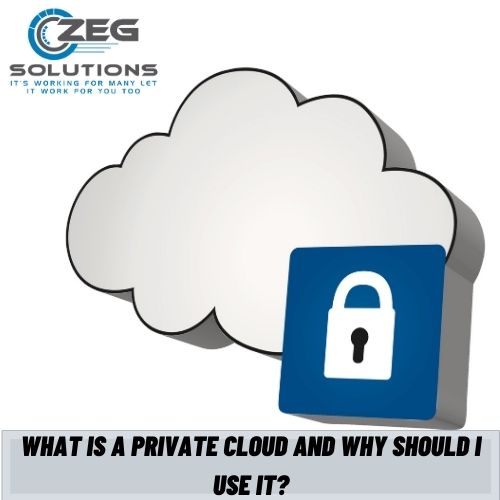As you look for the right server environment, you will come across more and more hosted term cloud management. This solution promises flexible scalability of resources needed in real-time and a wide range of services from the provider, providing facilities.
Enjoy higher security thanks to dedicated hardware and physical infrastructure that you only use with the private cloud. The pay-as-you-go model also provides you with instant billing for maximum freedom. In the following, you will get acquainted with the private cloud applications and their advantages and disadvantages.
What is a private cloud?
A private cloud is an infrastructure used exclusively by an institution, organization, or company based on cloud architecture. Internal resources manage a private cloud, but this does not necessarily mean that private clouds must be physically present at your company or organization.
A private cloud is defined by the privacy settings and management accountability of the organization or company, not by the physical location of the hardware and its ownership.
All types of cloud-based services are available in the private cloud, including SaaS, PaaS, and IaaS. Simultaneously, you can take advantage of more control over resources and multi-user technology for an application (Multi-Tenancy).
How do you get the key benefits of cloud computing in your private IT infrastructure?
Suppose you are an essential company or organization with a lot of private data. Turn to virtualization when you have hardware limitations. But when you have severe limitations in virtualization, you will need a private cloud.
Pharmaceutical companies with their secret and expensive formulas, investment companies with heavy data and always in need of processing and very private, or even companies that provide IoT (Internet of Things) services and are part of the Big Data owned by their users, definitely need Cloud-based services are especially a private cloud for their IT infrastructure.

What are the essential features and benefits of a Private Cloud?
Private clouds are more than just a virtualized platform. They are a diverse summary of computing resources and controlled automated access to those resources. Private clouds, beyond traditional virtualization, provide unique features to your organization.
- Build a high-capacity infrastructure to meet the demands of heavy computing and cloud data storage, with large volumes
- Have ready-to-use services that use automated and customized user interfaces for your organization.
- The use of a mechanical user interface (Self-Service Interface) controls services. It allows the organization’s IT experts to allocate the necessary resources to customers within the organization with more leeway and speed.
- Allocate efficient computing resources based on user needs.
- Awareness of the computer resources allocated to the infrastructure.
- Eliminate moments when empty capacities are not used.
- Possibility of customization in automatic settings and balanced distribution of required resources, since the necessary resources are not limited by their physical installation settings (thanks to virtualization).
- Implement complicated privacy and security settings designed for the company’s specific circumstances or organization and can not be provided on the public cloud.
When do we need a Private Cloud?
The private cloud is an ideal solution for organizations and companies that want to have real-time computing and storage resources but cannot (or do not want to) use the public cloud.
Depending on your organization’s security policies, budgets and bylaws, and internal regulations, you will need to provide the resources your organization needs on a Private Cloud.
At the beginning of the article, companies and organizations that need to provide a high-security level and protect their data or perform uninterrupted and heavy calculations in their organization need a Private Cloud.
Pharmaceutical and medical equipment companies, investment and financial services companies, and organizations exchange high-volume data and files in their organizations, and on the other hand, observe the security and level of data access in their organization, such as architectural or provider companies. IoT services need a Private Cloud.
Whether you like it or not, your investment in private cloud infrastructure depends on the workloads (total computing at a given time) to be supported. Regular and anticipated workloads are well supported with traditional commercial virtualization products. But it would help if you had a Private Cloud when unintended, sudden, and thunderous processes occur (usually when you are stuck in essential functions, research and development, and telecommunications).
Turn to virtualization when you have hardware limitations. But when you have severe limitations in virtualization, you need a private cloud.
What is the main challenge in the private cloud, and how to deal with it?
The main challenge of the idea of a private Cloud arises in the face of the concept of cloud computing. That the user should not have information about infrastructure and how to manage cloud computing, but in some cases, a company or organization needs to implement and manage its private cloud infrastructure. This is a big challenge for many organizations. On the other hand, due to the private cloud’s isolated nature, the scalability and flexibility in the allocation and distribution of resources will be impaired. The private cloud will have less scalability and flexibility than the public cloud.
In the face of these two critical challenges, private cloud proponents suggest using a company or a third-party organization. This company or organization will take care of the management and implementation of your private cloud and implement your private cloud among its public Cloud according to your organization’s specific needs. Therefore, both the problem of personal cloud management and scalability and limitations in the private cloud will be solved. This way, you can implement your private cloud as a Virtual Private Cloud in a public cloud with unlimited possibilities.
Beyond that, suppose your organization’s policies and privacy requirements still do not consent to your private cloud being placed in the heart of a public cloud. No worries. You can even own your cloud. And again, take advantage of the unlimited possibilities of public cloud computing. In this case, you will need a hybrid cloud. Your data will be stored and processed in your organization’s private cloud under your security standard. You will use public cloud features if required under fully secure and encrypted protocols for heavier processing.
Cloud computing, at the edge of technology, will overcome all the limitations of your organization. Therefore, there will no longer be a limit to data processing and file storage and protection.
Private cloud support services for large companies, organizations, and businesses
Backup cloud storage services are implemented on an integrated cloud platform. The name of this cloud platform is “Support Mountain Cloud.” Support Mountain Cloud can be deployed in any private IT environment and infrastructure, adding all the benefits of a public cloud to your private IT infrastructure. With the fastest and lowest cost, you will have your personal cloud to establish the cloud support mountain. Also, by measuring your organization’s needs about applications and data flow between your employees by implementing dedicated pipelines, your specific needs in your private cloud will be met. Finally, if your private cloud needs more processing resources, it will provide you with hybrid resources using secure protocols.
Get a private cloud at no cost to buy new hardware
“Support Mountain Cloud” can deploy on a set of servers that you currently have at your company and organization. No cost to buy new equipment, no extra charges in the face of tough sanctions, and the difficulty of importing new equipment. You use cloud technology in the same IT infrastructure you already have and the same flexibility, durability, and scalability of the public cloud specifically. And you will get it in your place.
The technology that Cloud Mountain supports is HCI, or Provider Infrastructure, which gives you unparalleled ability to grow and scale, manage and automate processes in the infrastructure, and ultimately reduce your maintenance and workforce costs to an incredible degree.
Cloud storage
Backup Cloud Storage with free upload and unlimited downloads, your personal and business file storage solution. External hard drive, flash memory, download host, upload center, internal server, and dedicated data center are redefined in the backup cloud storage.
Private Cloud: More control and security for companies
A private cloud provides cloud computing services to authorized users via the Internet or an internal network. Because a clearly defined group of users can only use it, the private cloud is also referred to as the enterprise cloud or inner cloud. Users of a private cloud enjoy the same benefits as cloud computing – scalability or traction. Still, they can also take advantage of additional control and configuration options for the private cloud.
Why should you use a private cloud?
A private cloud includes computing services that are not publicly available but are selected only for users. Unlike the public cloud, the relevant provider provides proprietary resources for this work. Access is via the Internet or a private internal network.
Private cloud services are specifically designed to meet the needs of companies. Private cloud infrastructure is hosted directly on-site at the company or in the service provider’s data center, which ensures a higher level of security. Individual components and services are tailored to the company – computer, storage, and network can be adapted separately.
How does a private cloud work?
The technical basis of the private cloud is virtualization. Modern virtualization strategies make it possible to separate IT services and resources from physical devices. Applications no longer need to run locally on end devices or servers but can be accessed virtually in the cloud.
Private cloud is an ideal solution, especially for companies that strictly adhere to data security and processing requirements. Compared to the public cloud, the private cloud not only offers a significantly higher level of security and control – but the personal space is also characterized by flexible use, as services are scaled based on the individual needs of the company, which results in greater efficiency Enables work to be done.
Authorized users can access private cloud applications through their corporate intranet or a VPN. For this purpose, users are given the necessary rights to authenticate themselves in cloud services. As a rule, external access to a private cloud is provided by the firewall. Simply put, a firewall protects personal computers or the entire computer network from unauthorized access.
Different types of private clouds
Private clouds can be divided into four types:
Internal Private Cloud:
The company operates the IT infrastructure for its cloud services.
Private cloud Managed: The cloud’s IT infrastructure is hosted internally but managed by an external provider. Companies can take advantage of the flexibility and ability to set up private clouds, functions that best suit the customer. This increases efficiency, and companies always have a trusted contact for all of a person’s cloud-related topics.
Host Private Cloud:
The host private cloud is located in an external data center providing cloud services. This provider manages the cloud on behalf of the company and makes the relevant applications available to users.
Private Cloud Society:
The private Cloud of society is a kind of private cloud. Several companies can access a shared private cloud. These companies usually come from the same industry or are in the same group. That is why the private cloud of society is also known as an industry-specific private cloud.
Creating a private cloud requires extensive technical knowledge and often costs companies a lot of time and money. Most of these are only available in tiny and medium-sized companies to a minimal extent, which causes P
It can turn a private cloud into a real challenge. In such cases, a managed or hosted private cloud is the cheapest choice for businesses.
What are the advantages and disadvantages of a private Cloud?
Companies enjoy the many benefits of cloud computing and still do not lose control of their data when using a private cloud. Unlike conventional IT structures, cloud computing is a compact system with which complete IT solutions can work more cost-effectively and efficiently.
benefits
Individual compatibility:
Cloud applications are tailored to the unique needs of the company.
Infrastructure Capacities:
Increase infrastructure capacities for large-scale computing and storage needs.
More security:
The separate operation of the private cloud minimizes security risks.
Cloud Features:
Cloud performance and bandwidth are exclusively available to users. Restrictions on the simultaneous use of third parties are not expected.
Disadvantage:
Office effort:
Using the internal hosting of public cloud solutions, the IT department should take responsibility and effort to manage the private cloud. In the case of external solutions, public cloud offers are usually more expensive than the public cloud.
Increased costs:
The use of private cloud space leads to personnel, management, and maintenance costs compared to the costs associated with operating conventional data centers. Reducing costs when using a public cloud is not easy.
Private cloud vs. public cloud
There are only a few technical differences between private and public clouds. However, the two forms of cloud computing are different in many ways. Public cloud services are available to everyone: although each user is independent, they generally all use the same resources. Private cloud only allows authorized users to access cloud services, so resources are not shared. Also, the computer, storage, and network capacity can be adapted to the needs of the company in a private cloud. As a rule, the public cloud can not be precisely adjusted to a customer. However, the public cloud also has definite advantages:
Flexibility: Because the Cloud can be accessed through the public Internet
Reduce personnel costs: No longer necessary due to the operation and maintenance of IT resources.
And also, without the cost of investing in server hardware.
Payment based on actual consumption
Focus on the main work
Professional security management by the service provider
The provider installs the upgrade.
Managed cloud hosting: custom servers
Managed cloud hosting: Flexible server structure with the push of a button
Hybrid Cloud
The so-called hybrid cloud combines the benefits of private and public clouds into one cloud model. The hybrid cloud offers high flexibility and low cost, which is comparable to the public cloud and meets companies’ security and data protection requirements, as certain services can only be used as a private cloud internally. So companies benefit from cost savings, remain flexible, and can still store sensitive data securely domestically.
Convergent systems for more order in IT?
The classical data center can be made much smaller with convergence systems. By eliminating very complex infrastructures and different work fields, the company’s information technology must work more efficiently, dynamically, and cost-effectively. This is made possible by standard prefabricated hardware and complete virtualization.
Result
A private cloud includes computing services that are not publicly available but are selected only for users. Unlike the public cloud, the relevant provider provides proprietary resources for this work. Access is via the Internet or a private internal network.
Private cloud services are specifically designed to meet the needs of companies. Private cloud infrastructure is hosted directly on-site at the company or in the service provider’s data center, which ensures a higher level of security. Individual components and services are tailored to the company – computer, storage, and network can be adapted separately.
With a private cloud, you can organize, manage, deliver, and use IT services with more flexibility. In particular, companies can usually access and analyze information faster through a private cloud, and therefore make decisions more quickly. Other benefits: You can develop and introduce new business functions quicker and expand or reduce your business activities as needed. Unlike other cloud solutions, only you have access to the private cloud, which ensures increased data security.
Above, we talked about the advantages and disadvantages of a private Cloud.



